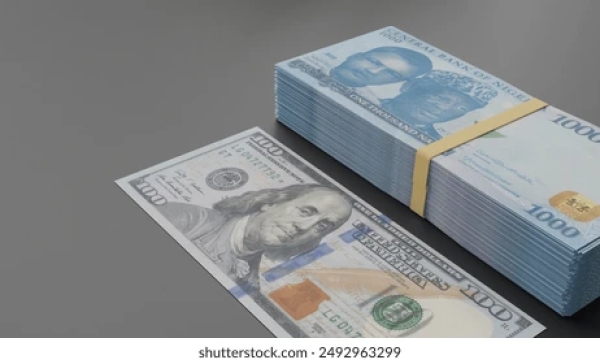Since President Bola Tinubu's inauguration on May 29, 2023, the Nigerian Naira has experienced a sharp and persistent decline in value. At the time of Tinubu's assumption of office, the official exchange rate stood around N465/$. However, after the decision to float the Naira and unify Nigeria’s multiple exchange rates, the currency has depreciated dramatically, losing over 70% of its value. As of recent, the Naira traded at about N1,700/$ in the parallel market, marking a massive devaluation that has exacerbated Nigeria's inflationary pressures and living costs.
Several factors have contributed to this devaluation, with the following issues making it clear that the Naira will not appreciate in value in the near future.
1. Dependence on Crude Oil and Declining Output
Nigeria’s economy is heavily dependent on crude oil exports, which make up the bulk of the country’s foreign exchange earnings. However, Nigeria’s oil production has been hampered by significant challenges, especially massive oil theft in the Niger Delta region. While Nigeria once produced up to 2.4 million barrels per day (bpd), current estimates show the country’s output now hovers around 1.5 million bpd. This reduction severely limits Nigeria’s capacity to generate foreign exchange through oil exports.
Additionally, a significant portion of Nigeria’s future oil output is already committed to servicing loans, such as the recent $3.2 billion loan from the African Export-Import Bank (Afreximbank). The use of oil receipts to offset debts reduces the foreign exchange available to support the Naira.
2. Dangote Refinery and the Opportunity Cost of Local Refining
The much-anticipated Dangote Refinery, which promises to reduce Nigeria’s dependence on imported refined petroleum products, is often cited as a possible solution to the Naira’s challenges. The refinery is expected to conserve about 35% of foreign exchange that Nigeria currently spends on fuel imports.
However, this gain comes with a significant trade-off. Instead of exporting crude oil to earn foreign currency, the government will have to sell crude oil to the refinery in Naira, thus missing out on potential foreign exchange earnings. This opportunity cost diminishes the potential benefit of local refining, further complicating efforts to stabilize or improve the value of the Naira.
3. Challenges in the Manufacturing Sector
Nigeria’s manufacturing sector has been severely constrained by the scarcity of foreign exchange and rising energy costs. Manufacturers who previously produced goods for export to the broader West African market are now struggling to stay afloat, as they face difficulties in obtaining the necessary foreign currency to import machinery, raw materials, and energy supplies.
The continued shutdown of manufacturing concerns means fewer foreign exchange inflows from non-oil exports, further weakening Nigeria's ability to accumulate foreign reserves and support the Naira. This sectoral decline contributes to the shortage of foreign exchange that is essential for stabilizing the currency.
4. Weak Foreign Investment Inflows
The floating of the Naira and exchange rate unification were intended to attract foreign investment by aligning the official and parallel market rates. However, the desired influx of foreign capital has not materialized at the scale needed to stabilize the currency. Foreign investors remain cautious, given Nigeria’s economic uncertainties, policy instability, and security risks.
Additionally, Nigeria’s high inflation rate, currently well above 30%, coupled with rising interest rates in developed economies, has made it less attractive for investors seeking stable returns. This is exacerbated by foreign exchange controls and difficulties in repatriating profits, making Nigeria a less appealing investment destination.
5. Inflation and Monetary Policy Limitations
The Central Bank of Nigeria (CBN) has faced challenges in managing inflation, which has been driven by both currency depreciation and supply-side factors, such as fuel and food price increases. The CBN's efforts to stabilize the Naira through higher interest rates and intervention in the foreign exchange market have so far been insufficient to counteract the broader forces driving the Naira’s depreciation.
Moreover, the float of the Naira, while theoretically designed to attract investment, has led to increased speculation and instability in the foreign exchange market, contributing to further depreciation. The divergence between the official rate and the parallel market rate has also created uncertainty, making it difficult for the CBN to exert effective control over the currency.
6. Global Economic Conditions
Global economic conditions, such as the increasing strength of the U.S. dollar due to rising interest rates by the Federal Reserve (until the first rate cut 2 weeks ago) have made it more expensive for countries like Nigeria to service foreign debt and acquire essential imports. As the U.S. dollar appreciates against other currencies, the Naira, already under pressure from domestic factors, has depreciated further.
The higher cost of servicing foreign debt means Nigeria must allocate more of its dwindling foreign reserves toward debt repayment, further reducing the amount of foreign exchange available to support the Naira.

